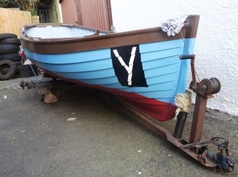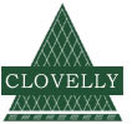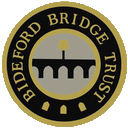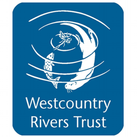Salmon Netting on the Taw & Torridge
with Stephen & Sheila Taylor
Here's the second film in the Boat Stories series!
Once upon a time almost everyone living by the Taw or Torridge in North Devon had access to a boat and tried to catch salmon. Licenses were restricted in the 1800s but for various reasons salmon numbers continued to dwindle. In 2002 the riparian owners (the rods men) offered to buy out the remaining nets men on the estuary for £10,000 each. Only three boats refused the money and continued to fish. Enjoy this story, told by 84 year old Stephen Taylor and his wife Sheila, documenting a traditional method of fishing which may soon disappear forever.
Filmed & edited by Simon Vacher. Music by Becki Driscoll & Nick Wyke (English Fiddle) Directed & produced by Jo Stewart-Smith
Once upon a time almost everyone living by the Taw or Torridge in North Devon had access to a boat and tried to catch salmon. Licenses were restricted in the 1800s but for various reasons salmon numbers continued to dwindle. In 2002 the riparian owners (the rods men) offered to buy out the remaining nets men on the estuary for £10,000 each. Only three boats refused the money and continued to fish. Enjoy this story, told by 84 year old Stephen Taylor and his wife Sheila, documenting a traditional method of fishing which may soon disappear forever.
Filmed & edited by Simon Vacher. Music by Becki Driscoll & Nick Wyke (English Fiddle) Directed & produced by Jo Stewart-Smith
Video blog on the story behind and making of salmon netting on the Taw & Torridge
I first met Stephen and Sheila Taylor in April – long before
the salmon netting season opens on the 1st June. Even then they were itching for it to
begin. “It keeps Stephen going,” Sheila told me. “I don’t know what we’re going to do if we can’t get him
fishing. We’ll have to carry him down to the boat!” I was worried that at 84
and 77, Stephen and Sheila might not want to be bothered with a film crew, but
they were very keen that we filmed their story.
As Sheila said, “Once Stephen stops, the skills will be lost.” Today there
are only three netting licenses left on the Taw and Torridge: Jackie Cox from
Appledore has one and Stephen’s son, Peter has the third. Peter rarely uses his
license – he’s busy out on his fishing trawler, Anna Marie, as the season for catching
squid in the Bristol Channel clashes with the short salmon season.
Stephen started salmon netting as a boy – way back in the 30s and the stories he tells move back and forth to present day. In this video blog we've included some short clips which didn't make the five minute cut. Watch the main film first! Stephen first learned to read the moods of the tides and the currents out fishing with his uncles in the days when the salmon boats were larger, the nets heavier and each boat had three crew plus the skipper. Even then you had to have a salmon license, the season was restricted and every ex salmon fisherman I meet tells tales of dodging the water bailiffs. Not that long ago there were seven river bailiffs watching the estuary.
Stephen started salmon netting as a boy – way back in the 30s and the stories he tells move back and forth to present day. In this video blog we've included some short clips which didn't make the five minute cut. Watch the main film first! Stephen first learned to read the moods of the tides and the currents out fishing with his uncles in the days when the salmon boats were larger, the nets heavier and each boat had three crew plus the skipper. Even then you had to have a salmon license, the season was restricted and every ex salmon fisherman I meet tells tales of dodging the water bailiffs. Not that long ago there were seven river bailiffs watching the estuary.
|
|
In the early days you could make the cost of the license
back in a week. As Stephen says in this first outtake – you’d give your right
arm to get a salmon license. There was a long waiting list and they were
usually granted to gravel bargemen or rabbit trappers – those who had seasonal
work – to give them a chance to earn a bit more. Watch the outtake to see how
Stephen got his license. “All hell broke loose when I got it,” he told me
laughing merrily “but they couldn’t do nothing about it.”
I hope that’s one of the things you’ll take away from this film - how this lovely couple work hard together and have a good laugh. As they fish, they banter with and rib each other and there were times when Simon struggled to keep the camera still because we were both laughing helplessly. |
|
Stephen is in
charge of the fishing: which draft he will choose to shoot the nets – shouting
orders to Sheila. As he says on the film, “my crew is Sheila, – if she’s doing
her job properly, which she does most of the time.” After all, Sheila is Stephen’s
second wife – so she’s only been fishing with him for a mere 30 years! In other
ways Sheila is clearly the boss. She told me she comes out to make sure Stephen’s
safe and she won’t let him fish at night any more, “we’re a long way from help –
anything could happen.” They both speak wistfully of fishing under a full moon,
or watching the sun rise and break through the mist hanging over the river – and
of the wildlife they see (watch the clip on your right.) Sheila prefers
to come when the sun is shining – and who can blame her – but out filming, we
soon discover that she knows her fish.
|
|
|
|
“I can feel the net jigging”, she tells me. “I know when there’s a salmon there.” We note the healthy competition between them – as in who spots the salmon first! Sheila, as is clear from the next clip, is just as keen to beat the records.
Stephen used to fish for salmon at night because he worked during the day in a slaughterhouse. In the old salmon season from April to August, he only slept if the "tide was wrong for fishing because I had three boys to rear and the salmon was the best way to earn a bit of money.” Stephen set up the original fishmongers in Butcher’s Row, Barnstaple. It was sold on to Scott Wharton at S&P trawlers and is now owned and run by Passmores (see our fish page.) Stephen also owned trawlers, two sons are working trawlerman and one of his grandsons is skipper of the Sparkling Star, which will star in another Boat Stories film. |
In 1932, 6317 salmon were netted on the estuary. Some fishermen were paid in
salmon and used to grumble that they had to eat it too often. Over the years
the numbers of salmon returning to their native rivers has fallen
dramatically. There are lots of reasons including barriers such as weirs and
the poor quality of the waters in the rivers where they breed. Stephen took us
through the detailed history of the numbers of salmon boats licensed on the
river – but we had to cut this down for our five minute film. In 1901 licenses
to net on the Taw and Torridge were restricted to 36 – this number lasted until
the 80s. Then, for a time, netting was banned in an attempt to allow salmon
stocks to recover and a new order brought the number of licenses down to 14. In
2002, the rods – the riparian owners,
clubbed together and tried to buy the 14 remaining netsman out, with £10,000
pounds per license. All except three took the money – probably believing that
in the next ten year cycle they’d get their licenses back again. In the film
Stephen says, “I refused the money just to have this way of life.” This line
doesn’t quite make sense because we don’t explain the offer of money, so as
director I should have taken it out! I left it in to show that at 84,
Stephen lives to fish rather than fishes for a living. Today the eight
week license costs £340 and with the competition from farmed salmon, they’re
lucky to make that back. In 2002 the net limitation order was zero which meant
that when the three remaining netsman died or gave up their licenses there
would as Stephen says be ‘no more netting on the Taw and Torridge –ever again.
 traditional salmon boat built by John Daniel
traditional salmon boat built by John Daniel
It’s not just the artisanal netting skills that will be
lost. Salmon boats were built specifically for this river by local boat
builders. Stephen’s salmon boat, Pugsey,
was built by his friend John Daniel who sadly died before Boat Stories got the
chance to speak to him. John’s grandson, Carl, took me to see his final salmon
boat, built, like all of them in the tiny garage of his cottage in East the
Water. Stephen told me John named her Y –telling him with his usual sense of
humour that didn’t know what else to call it.
|
Stephen and Sheila gave us plenty of warnings that we might
not catch a salmon. Sheila said “we never catch anything when someone comes out
with us.” And, like all fishermen I know, Stephen gave plenty of reasons. “There’s an easterly wind blowing” (you can hear
it gusting and roaring up the estuary as we filmed !) we never catch fish on an easterly.” And every
now and again he muttered, “what will people say, if old Taylor can’t catch a
fish.”
Watch the film to find out if they caught anything. There’s no doubt Stephen’s a canny fishermen with lots more skills and lovely anecdotes than we’re able to show you in five minutes. This last outtake is one of those tales. This film will be shown at some events (we’ll put the details on our facebook page and website) and we hope that Sheila and Stephen will join us to tell more of their stories. |
|
Despite being tired and wet after the heavy fishing session,
this lovely couple let us film a short interview back at the changing hut. The
last line we recorded was Stephen, grinning, saying he’d booked a patch in the
sunshine at Heanton church, so he could watch over the estuary and keep an eye
on the poachers catching fish. Simon and I raced up to Heanton church to get
that view. In theory, there should be
someone, fishing legally, for Stephen to watch. Last year the Environment
Agency agreed (if as Stephen puts it all three licensees ‘are killed on a bus’)
to grant one more license on the river, on the basis that the salmon stocks are
showing small signs of recovery. I like
to think the license is also, in part, an acknowledgment that salmon netting on
the river has been such an important way of life for so many North Devonians – it
would sad to lose it - forever.
Many thanks to Sheila and Stephen Taylor for taking Simon Vacher and myself out salmon netting – for being so patient with us and telling us so many lovely stories. It was a huge privilege to spend time with them. Thanks to Paul Carter from the Environment Agency for helping me with initial research, the history of salmon netting and the byelaws. And thanks again to the brilliant Simon who once again juggled camera and sound and working from boats and got it all as it happened on location and also edited the film. Finally thanks to Becki Driscoll and Nick Wyke, two talented fiddle players from Bideford: www.engishfiddle.com for letting us use their music.
Jo Stewart-Smith August 2014
Many thanks to Sheila and Stephen Taylor for taking Simon Vacher and myself out salmon netting – for being so patient with us and telling us so many lovely stories. It was a huge privilege to spend time with them. Thanks to Paul Carter from the Environment Agency for helping me with initial research, the history of salmon netting and the byelaws. And thanks again to the brilliant Simon who once again juggled camera and sound and working from boats and got it all as it happened on location and also edited the film. Finally thanks to Becki Driscoll and Nick Wyke, two talented fiddle players from Bideford: www.engishfiddle.com for letting us use their music.
Jo Stewart-Smith August 2014












